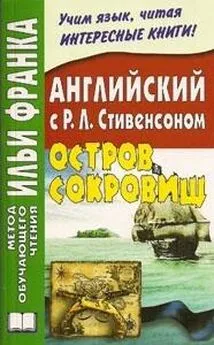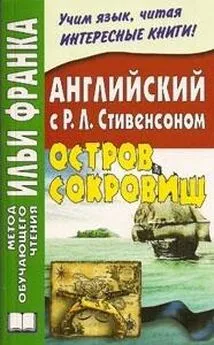Илья Франк - Английский язык с Р.Л. Стивенсоном. Остров сокровищ
- Название:Английский язык с Р.Л. Стивенсоном. Остров сокровищ
- Автор:
- Жанр:
- Издательство:неизвестно
- Год:неизвестен
- ISBN:нет данных
- Рейтинг:
- Избранное:Добавить в избранное
-
Отзывы:
-
Ваша оценка:
Илья Франк - Английский язык с Р.Л. Стивенсоном. Остров сокровищ краткое содержание
Английский язык с Р.Л. Стивенсоном. Остров сокровищ - читать онлайн бесплатно ознакомительный отрывок
Интервал:
Закладка:
under his arm (медная подзорная труба /была/ под мышкой), his hat tilted back
upon his head (шляпа съехала назад на его голове; to tilt — наклониться,
откинуться ). I remember his breath hanging like smoke in his wake as he strode
off (помню, /как/ его дыхание = выдыхаемый воздух клубился, словно дым,
когда он шел; to hang — висеть в воздухе; wake — попутный поток, волны
от плавающего предмета или человека; to stride — шагать большими
шагами ), and the last sound I heard of him (и последним звуком, /который/ я
услышал от него), as he turned the big rock (когда он обогнул большую скалу),
was a loud snort of indignation (было громкое фырканье негодования), as
though his mind was still running upon Dr Livesey (словно его разум = память
все еще /была/ занята доктором Ливси; to run upon — вертеться вокруг,
возвращаться к чему-то /в мыслях/ ).
Мультиязыковой проект Ильи Франка www.franklang.ru
30
stones [stqunz] touching [`tACIN] cutlass [`kAtlqs] seaward [`sJwqd] breath
[breT]
1. It was one January morning, very early — a pinching, frosty morning —
the cove all grey with hoar-frost, the ripple lapping softly on the stones, the
sun still low and only touching the hilltops and shining far to seaward. The
captain had risen earlier than usual, and set out down the beach, his cutlass
swinging under the broad skirts of the old blue coat, his brass telescope under
his arm, his hat tilted back upon his head. I remember his breath hanging like
smoke in his wake as he strode off, and the last sound I heard of him, as he
turned the big rock, was a loud snort of indignation, as though his mind was
still running upon Dr Livesey.
1. Well, mother was upstairs with father (мать была наверху с отцом); and I was
laying the breakfast table against the captain's return (а я накрывал стол для
завтрака к возвращению капитана), when the parlour door opened (когда дверь
/общей/ комнаты открылась), and a man stepped in on whom I had never set my
eyes before (и человек вошел, на которого я никогда не наставлял своих глаз
раньше = которого никогда не видел).
2. He was a pale (он был бледным), tallowy creature (жирным /упитанным/
существом; tallow — жир, сало /для свечей, мыла/ ), wanting two fingers of the
left hand (нуждающимся в двух пальцах = без двух пальцев левой руки; want
of — недостаток, нехватка ); and, though he wore a cutlass (хотя он носил
кортик), he did not look much like a fighter (не выглядел очень как боец =
воинственно). I had always my eye open for seafaring men (я имел всегда мой
Мультиязыковой проект Ильи Франка www.franklang.ru
31
глаз открытым = смотрел в оба за моряками), with one leg or two (/будь то/ с
одной или с двумя ногами), and I remember this one puzzled me (и помню, /как/
этот озадачил меня; to puzzle — ставить в тупик, недоумевать ). He was not
sailorly (не был похож на моряка; sailorly — подобающий моряку ), and yet he
had a smack of the sea about him too (и все же имел привкус /запах/ моря
вокруг него также = я чувствовал, что он моряк).
upstairs [Ap`steqz] breakfast [`brekfqst] creature [`krJCq] fighter [`faItq]
sailorly [`seIlqlI]
1. Well, mother was upstairs with father; and I was laying the breakfast table
against the captain's return, when the parlour door opened, and a man
stepped in on whom I had never set my eyes before.
2. He was a pale, tallowy creature, wanting two fingers of the left hand; and,
though he wore a cutlass, he did not look much like a fighter. I had always my
eye open for seafaring men, with one leg or two, and I remember this one
puzzled me. He was not sailorly, and yet he had a smack of the sea about him
too.
1. I asked him what was for his service (я спросил его, что было /угодно/ для его
обслуживания = что ему угодно), and he said he would take rum (сказал, /что/
он возьмет ром); but as I was going out of the room to fetch it (но когда я был
выходящим = выходил из комнаты, чтобы принести его) he sat down upon a
table (он сел за стол), and motioned me to draw near (и показал жестом мне
приблизиться = подозвал меня). I paused where I was with my napkin in my
hand (я остановился /там/, где я был с салфеткой в руке).
Мультиязыковой проект Ильи Франка www.franklang.ru
32
2. 'Come here, sonny (иди-/ка/ сюда, сынок),' says he. 'Come nearer here
(подойди ближе сюда).'
3. I took a step nearer (я шагнул: «взял шаг» ближе).
4. 'Is this here table for my mate, Bill (этот здесь = вот стол /накрыт/ для моего
приятеля, Билла)?' he asked, with a kit of leer (он спросил с хитрым взглядом;
kit — обмундирование, снаряжение, экипировка; to leer — смотреть хитро,
злобно ).
service [`sq:vIs] motioned [`mquSnd] paused [pLzd] mate [meIt] leer [lIq]
1. I asked him what was for his service, and he said he would take rum; but as
I was going out of the room to fetch it he sat down upon a table, and motioned
me to draw near. I paused where I was with my napkin in my hand.
2. 'Come here, sonny,' says he. 'Come nearer here.'
3. I took a step nearer.
4. 'Is this here table for my mate, Bill?' he asked, with a kit of leer.
1. I told him I did not know his mate Bill (я сказал ему, что не знаю его
приятеля Билла); and this was for a person who stayed in our house (а этот /стол/
был для человека, который остановился в нашем доме), whom we called the
captain (кого мы звали капитаном).
2. 'Well (что ж),' said he, 'my mate Bill would be called the captain as like as not
(мой приятель Билл мог бы назваться = возможно, назвался капитаном, не
Мультиязыковой проект Ильи Франка www.franklang.ru
33
исключено). He has a cut on one cheek (у него порез = шрам на одной щеке),
and a mighty pleasant way with him (очень приятную манеру /поведения/),
particularly in drink (особенно в пьяном виде), has my mate, Bill (имеет мой
приятель, Билл). We'll put it, for argument like (мы примем это, за довод
вероятный = предположим; we'll = we will ), that your captain has a cut on one
cheek (что ваш капитан имеет шрам на одной щеке) — and we'll put it, if you
like (и, допустим, если хочешь), that the cheek's the right one (что щека
правая). Ah, well (ага, правильно)! I told you. Now, is my mate Bill in this here
house (итак, /скажи/, здесь ли мой приятель Билл, в этом вот /здесь/ доме)?'
3. I told him he was out walking (я сказал ему, что он пошел прогуляться; to be
out — не быть дома; to walk — идти, гулять ).
pleasant [pleznt] particularly [pq`tIkjulqlI] argument [`Rgjumqnt]
1. I told him I did not know his mate Bill; and this was for a person who
stayed in our house, whom we called the captain.
2. 'Well,' said he, 'my mate Bill would be called the captain as like as not. He
has a cut on one cheek, and a mighty pleasant way with him, particularly in
drink, has my mate, Bill. We'll put it, for argument like, that your captain has
a cut on one cheek — and we'll put it, if you like, that the cheek's the right
one. Ah, well! I told you. Now, is my mate Bill in this here house?'
3. I told him he was out walking.
1. 'Which way, sonny? Which way is he gone (каким путем = куда он ушел)?'
Мультиязыковой проект Ильи Франка www.franklang.ru
34
2. And when I had pointed out the rock (и когда я указал скалу) and told him how
the captain was likely to return (и сказал ему, каким образом = откуда капитан,
вероятно, мог вернуться), and how soon (и как скоро), and answered a few other
questions (ответил на несколько других вопросов), 'Ah,' said he, 'this'll be as
good as drink to my mate Bill (это /увидеть меня/ будет так же хорошо, как
выпивка для моего приятеля Билла; this'll = this will ).'
3. The expression of his face as he said these words (выражение его лица, когда
он произнес эти слова) was not at all pleasant (не было вовсе приятным), and I
had my own reasons for thinking (и я имел свои собственные основания
думать: «для думания») that the stranger was mistaken (что незнакомец
ошибался), even supposing he meant who he said (даже полагая, /что/ он имел в
виду /того/, о ком сказал). But it was no affair of mine, I thought (это было не
мое дело, я подумал); and, besides (и, кроме того), it was difficult to know what
Читать дальшеИнтервал:
Закладка:


